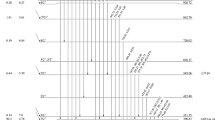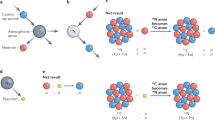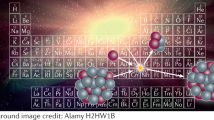Abstract
IT was suggested by the writer in 1912 that the end-products of the uranium and thorium disintegration series should differ in atomic weight from that of common lead, which chemically they closely resemble. As the atomic weights of these products, determined experimentally later by Richards and others as approximately 206 and 208 respectively, “bracketed” the atomic weight of common lead, it was not unreasonable to suppose that common lead is a mixture of isotopes of which the mass-numbers 206 and 208 are chief. This, although probable, is still unproved. The further deduction that conceivably lead in Nature has been mainly produced by the disintegration of uranium and thorium has received some, but not a great measure of support. If it could be shown experimentally that common lead has some isotopes which are not likely to be produced by disintegration, this hypothesis would be more difficult to maintain; if the difference were complete the hypothesis would be disproved.
This is a preview of subscription content, access via your institution
Access options
Subscribe to this journal
Receive 51 print issues and online access
$199.00 per year
only $3.90 per issue
Buy this article
- Purchase on Springer Link
- Instant access to full article PDF
Prices may be subject to local taxes which are calculated during checkout
Similar content being viewed by others
Author information
Authors and Affiliations
Rights and permissions
About this article
Cite this article
RUSSELL, A. The Isotopes of Lead. Nature 112, 619–620 (1923). https://doi.org/10.1038/112619a0
Issue Date:
DOI: https://doi.org/10.1038/112619a0
Comments
By submitting a comment you agree to abide by our Terms and Community Guidelines. If you find something abusive or that does not comply with our terms or guidelines please flag it as inappropriate.



